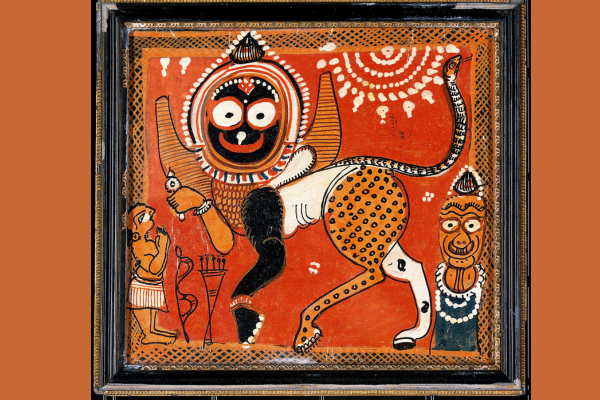
With Ujaan Ghosh
Assistant Professor in the Department of History of Art
This talk will focus on an episodic interrogation of the Sarala Dasa’a fifteenth-century Odia Mahābharāta. Sarala self-identified himself as a Śudra-Muni (a saint from the lower caste) who furnished his own rendition of the epic.
Sarala’s rendition constitutes one of the most unusual narrations of the epic. Even though the basic tropological structure largely mirrors the Sanskrit canon, the author drastically alters several cardinal episodes of the text. In the past, historians of Odia literature brushed these deviations aside simply as fantasies of an “unlettered peasant.” However, as Ghosh demonstrates, Sarala’s subversions were in no way arbitrary insertions in the epic canon. His narrative alterities were deeply conscious and served as his vehicle for his political subjectivity. Ghosh studies two crucial episodes from Sarala’s text—namely the infamous disrobing of Draupadi in the assembly hall and Kṛṣṇa’s theophany in the Kuru court. In the Odia text, both these episodes meet a significantly different conclusion, when compared with its Sanskrit counterpart. Ghosh will situate these alternative imaginations of the poet in the backdrop of the gamut of socio-political changes in early modern Odisha to generate a nuanced understanding.
Ujaan Ghosh is an Assistant Professor in the Department of History of Art at Ohio State University. He is currently working on his book project, which focuses on the dialectics of Global Visual Cultures and Local Spatial Practice in Indian Holy cities. Ujaan is also engaged in various translation projects from Odia and Bangla into English. Some of his translations have appeared in Critical Discourse in Odia (Routledge 2020).
This event is free and open to the public. Sponsored by the South Asian Studies Initiative.
The Humanities Institute and its related centers host a wide range of events, from intense discussions of works in progress to cutting-edge presentations from world-known scholars, artists, activists and everything in between.
We value in-person engagement at our events as we strive to amplify the energy in the room. But we also recognize the fact that not all our guests will be able to visit our space. Zoom access will be available to this event upon request. If you wish to have such access, or you would like to request other accommodations for this event, please send your request to Connor Behm: behm.42@osu.edu.
